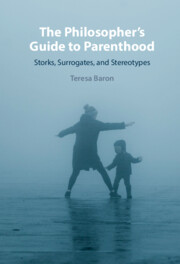Book contents
- The Philosopher’s Guide to Parenthood
- The Philosopher’s Guide to Parenthood
- Copyright page
- Dedication
- Contents
- Acknowledgements
- Introduction
- Chapter 1 Babies, Blueprints, and Blood Ties
- Chapter 2 Social Roles, Stereotypes, and Being ‘Seen’ as a Parent
- Chapter 3 ‘Do You Have a Licence for That?’ Legal Parenthood and Transfers of Children
- Chapter 4 Duties, Dilemmas, and (Re)distribution
- Chapter 5 Paradigms and Parental Projects
- Conclusion
- Bibliography
- Index
Chapter 2 - Social Roles, Stereotypes, and Being ‘Seen’ as a Parent
Published online by Cambridge University Press: 15 January 2023
- The Philosopher’s Guide to Parenthood
- The Philosopher’s Guide to Parenthood
- Copyright page
- Dedication
- Contents
- Acknowledgements
- Introduction
- Chapter 1 Babies, Blueprints, and Blood Ties
- Chapter 2 Social Roles, Stereotypes, and Being ‘Seen’ as a Parent
- Chapter 3 ‘Do You Have a Licence for That?’ Legal Parenthood and Transfers of Children
- Chapter 4 Duties, Dilemmas, and (Re)distribution
- Chapter 5 Paradigms and Parental Projects
- Conclusion
- Bibliography
- Index
Summary
This chapter begins by clarifying the distinction between social parenthood and parenting and explain how the longstanding but malleable association between social and biological parenthood depends upon social and legal conventions determining who is eligible to parent. One way in which to place oneself in that situation is to conceive a child biologically – however, biological parenthood often comes apart from social parenthood. I explore the significance of clinical assistance, money, and distance, in navigating this separation in the context of assisted reproduction. The second part of the chapter incorporates gender into the analysis, looking in detail at the social roles of motherhood and fatherhood, and the interplay of biological parenthood and moral parenthood with the expectations associated with these roles – for example, the effect of the visibility of pregnancy on attributional parenthood, the characterisation of fatherhood as more detached and less sentimental than motherhood, the persistence of associations between fatherhood and breadwinning, and so on. In this chapter, I explore the findings of sociological, psychological, and anthropological research into motherhood and fatherhood in order to demonstrate that one can inhabit a social role comprised in part by normative standards, even if one does not conform to those standards.
Keywords
- Type
- Chapter
- Information
- The Philosopher's Guide to ParenthoodStorks, Surrogates, and Stereotypes, pp. 50 - 86Publisher: Cambridge University PressPrint publication year: 2023

